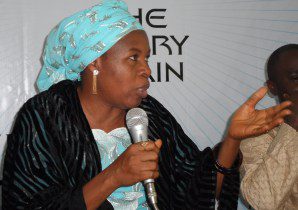Forgotten Dairies
The Criminal Neglect of Abuja Indigenes -By Zainab Suleiman Okino


Zainab Suleiman Okino
It is almost becoming a deliberate policy of successive governments to pass over Abuja indigenous people in political appointments. Last week, the senator representing the FCT, Senator Phillip Aduda raised an alarm about this development after President Muhammadu Buhari failed to include a ‘native’ in his list of ambassadorial nominees to the Senate for screening.
When Buhari appointed his ministers late last year, there were hues and cries over the non-inclusion of any indigene of Abuja. I doubt if there was ever any effort to assuage their fears despite the numerous appointments that have been made since then, until last week when another round of ambassadorial nominees were presented to the Senate.
The unfair representation of an ethnic group whose land has been taken away, livelihood and lifestyle disrupted to host the seat of power and people from all parts of the country, is to say the least not justiceable.
One reason why this level of discriminations thrive is the dilemma over Abuja’s status. That is the question of whether Abuja should be treated as a state or just an administrative headquarters.
The Act establishing the Federal Capital Territory provides for “… the delegation to the Minister of Federal Capital Territory of the executive powers vested in the President and those vested in him and the Governor of a State under the applicable laws.”
So far, it is not clear if the law as articulated by the FCT Act has taken cognisance of Abuja as a state in its own right. As a city-state, Abuja should have its mayor, who will serve and act as governor while it draws its allocation from the federation account and the rights and privileges of the indigenes taken care of. The absence of a defined state-status for the FCT has further subsumed the rights and privileges of the people under a humongous federal structure controlled mainly by the president.
However, the denial of their rights and inequity would not have been so palpable, if the president makes conscious efforts to make them feel a sense of belonging through human resource development, appointments and provision of social amenities and infrastructure. There is virtually no government presence in the rural communities where they mostly reside. FCT ministers who have had to spread development to such communities, in most cases, concentrate attention in the city centre and its precincts where the rich and elites reside to the utter neglect of the rural communities.
One of the most successful programmes enunciated by the Nasir El-Rufai administration as FCT minister was the resettlement scheme, structured to provide houses for displaced communities. Even that has run into troubled waters because successor FCT administrations have their own programme and agenda, but which unfortunately have not uplifted the ‘natives’. Till today, only Apo resettlement has been successfully carved out for the indigenes in name only. Apart from the substandard houses and roads, there is no form of government presence there. There is no water, no hospital and the road leading to the place is a single lane, which makes movement to and from Apo resettlement almost impossible.
Where else can this form of accommodation and assimilation occur without tension, except in a Gbagi community. It is easy to say ‘civilisation’ has been brought to their door steps since the relocation of the seat of power from Lagos to Abuja, but let it also be known that without the people’s tolerance and accommodating spirit, the lives of other Nigerians sandwiched among Gbagi communities would have been in danger. As a country, we seem to prefer fire brigade approaches, and we do not act until aggrieved people resort to violence. This is the kind of criminal negligence that gave birth to the Niger Delta conflict and predisposed them to violent attacks on oil installations and kidnap of expatriates and other oil workers which invariably back-lashed on the country in many ways.
From Australia to America to Palestine, history is replete with the oppression and suppression of indigenous people. In Australia, the Aborigines were dehumanised, and made to feel less human than the stranger-migrants who took over their country. The red Indians were killed and maimed by migrants running away from injustice in Europe and seeking sanctuary in the new world, the United States. Same goes for the people of Palestine, whose lands were taken over by the fleeing Jews from Europe seeking for the Biblical Promised Land. That has left that country shattered up till today, while the guilt of oppression of red Indians and Aborigines will remain evergreen. We should not push the Gbagis to the wall to the extent they will have no choice other than to take up arms against the state. A new opportunity has presented itself in a relatively new government to right the wrongs of the past and give Abuja indigenes their rightful place in the scheme of things.
Only these and more, and not platitudes can end the serial agitations of Abuja ‘natives’
zainabsule@yahoo.com



















